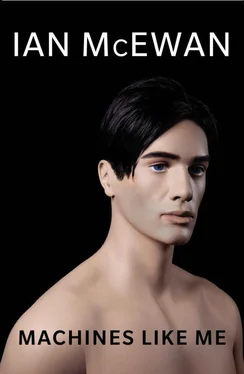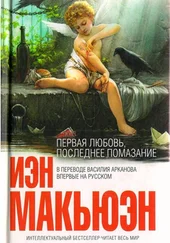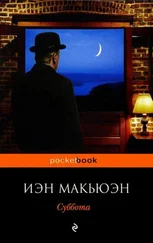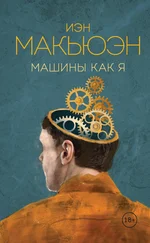It’s a cold, windy dusk in March. Other boys are hunched over their projects. We are twelve miles away from Shakespeare’s hometown, in what will come to be known as a ‘bog-standard’ comprehensive school. An excellent place, in fact. The fluorescent ceiling lights come on. Mr Cox is on the far side of the lab with his back turned. I don’t want to attract his attention in case of failure. I throw the switch and – miracle – hear the sound of static. I jiggle the variable-tuning capacitor: music, terrible music, as I think, because violins are involved. Then comes the rapid voice of a woman, not speaking English.
No one looks up, no one is interested. Building a radio is nothing special. But I’m speechless, close to tears. No technology since will amaze me as much. Electricity, passing through pieces of metal carefully arranged by me, snatch from the air the voice of a foreign lady sitting somewhere far away. Her voice sounds kindly. She isn’t aware of me. I’ll never learn her name or understand her language, and never meet her, not knowingly. My radio, with its irregular blobs of solder on a board, appears no less a wonder than consciousness itself arising from matter.
Brains and electronics were closely related, so I discovered through my teens as I built simple computers and programmed them myself. Then complicated computers. Electricity and bits of metal could add up numbers, make words, pictures, songs, remember things and even turn speech into writing.
When I was seventeen, Peter Cox persuaded me to study physics at a local college. Within a month I was bored and looking to change. The subject was too abstract, the maths was beyond me. And by then I’d read a book or two and was taking an interest in imaginary people. Heller’s Catch-18 , Fitzgerald’s The High-Bouncing Lover , Orwell’s The Last Man in Europe , Tolstoy’s All’s Well that Ends Well – I didn’t get much further and yet I saw the point of art. It was a form of investigation. But I didn’t want to study literature – too intimidating, too intuitive. A single-sheet course summary I picked up in the college library announced anthropology as ‘the science of people in their societies through space and time’. Systematic study, with the human factor thrown in. I signed up.
The first thing to learn: my course was pitifully underfunded. No bunking off for a year to the Trobriand Islands where, I read, it was taboo to eat in front of others. It was good manners to eat alone, with your back turned to friends and family. The islanders had spells to make ugly people beautiful. Children were actively encouraged to be sexual with each other. Yams were the viable currency. Women determined the status of men. How strange and bracing. My view of human nature had been shaped by the mostly white population crammed into the southern quarter of England. Now I was set free into bottomless relativism.
At the age of nineteen I wrote a wise essay on honour cultures entitled ‘Mind-forged Manacles?’ Dispassionately, I gathered up my case studies. What did I know or care? There were places where rape was so common it didn’t have a name. A young father’s throat was cut for failing in his duties to an ancient feud. Here was a family eager to kill a daughter for being seen holding hands with a lad from the wrong religious group. There, elderly women keenly assisted in the genital mutilation of their granddaughters. What of the instinctive parental impulses to love and protect? The cultural signal was louder. What of universal values? Upended. Nothing like this in Stratford-upon-Avon. It was all about the mind, the tradition, the religion – nothing but software, I now thought, and best regarded in value-free terms.
Anthropologists did not pass judgement. They observed and reported on human variety. They celebrated difference. What was wicked in Warwickshire was unremarkable in Papua New Guinea. Locally, who was to say what was good or bad? Certainly not a colonial power. I derived from my studies some unfortunate conclusions about ethics which led me a few years later to the dock in a county court, accused of conspiring with others to mislead the tax authorities on a grand scale. I did not attempt to persuade His Honour that far from his court might be a coconut beach where such conspiracy was respected. Instead, I came to my senses just before I addressed the judge. Morals were real, they were true, good and bad inhered in the nature of things. Our actions must be judged on their terms. This was what I’d assumed before anthropology came along. In quavering, hesitant tones I apologised abjectly to the court and dodged a custodial sentence.
*
When I entered the kitchen in the morning, later than usual, Adam’s eyes were open. They were pale blue, flecked with minuscule vertical rods of black. The eyelashes were long and thick, like a child’s. But his blink mechanism had not yet kicked in. It was set at irregular intervals and adjusted for mood and gestures, and primed to react to the actions and speech of others. Reluctantly, I’d read the handbook into the night. He was equipped with a blink reflex to protect his eyes from flying objects. At present, his gaze was empty of meaning or intent and therefore unaffecting, as lifeless as the stare of a shop-window mannequin. So far, he was showing none of the fractional movements that warmly typify the human head. Elsewhere, no body language at all. When I felt for the pulse in his wrist, I found nothing – a heartbeat without a pulse. His arm was heavy to lift, resistant at the elbow joint, as though rigor mortis was about to set in.
I turned my back on him and made coffee. Miranda was on my mind. Everything had changed. Nothing had changed. During my near sleepless night, I’d remembered that she was visiting her father. She would have gone straight to Salisbury from her seminar. I saw her on her train from Waterloo, sitting with an unread book on her lap, staring at the rushing landscape, the dip and rise of telephone lines, not thinking of me. Or thinking only of me. Or recalling a boy at her seminar who’d tried to out-stare her.
I watched the TV news on my phone. A brilliant mosaic in sound and sparkling seaside light. Portsmouth. The Task Force ready to depart. Most of the country was in a dream-theatre, in historical dress. Late medieval. Seventeenth century. Early nineteenth. Ruffs, hose, hooped skirts, powdered wigs, eyepatches, wooden legs. Accuracy was unpatriotic. Historically, we were special and the fleet was bound for success. TV and press encouraged a vague collective memory of enemies defeated – the Spanish, the Dutch, the Germans twice this century, the French from Agincourt to Waterloo. A fly-past by fighter jets. A young man in combat gear, fresh out of Sandhurst, narrowed his eyes as he told an interviewer of the difficulties ahead. A superior officer spoke of his men’s unshakeable resolve. I was moved, even as I disliked it. When a massed band of Highland pipers marched towards their ship’s gangplank, my spirits swelled. Then back to the studio for charts, arrows, logistics, objectives, sane voices in agreement. For diplomatic moves. For the prime minister in her trim blue suit on the steps of Downing Street.
I warmed to it, even though I often declared myself against it all. I loved my country. What a venture, what wild courage. Eight thousand miles. What decent people putting their lives at risk. I took a second coffee next door, made the bed to give the room the appearance of a workplace, and sat down to reflect a while on the state of the world’s markets. The prospect of war had sent the FTSE down a further one per cent. Still in patriotic mood, I assumed an Argie defeat and took a position on a toy and novelty group that made Union Jacks on sticks for people to wave. I also invested in two champagne importers, and bet on a big recovery generally. Merchant-navy ships had been requisitioned to transport troops to the South Atlantic. A friend who worked in asset management in the City told me that his company was predicting that some would be sunk. It made sense to short the major players in the insurance markets and invest in South Korean shipbuilders. I was in no mood for such cynicism.
Читать дальше










![Иэн Макьюэн - Таракан [litres]](/books/435106/ien-makyuen-tarakan-litres-thumb.webp)

